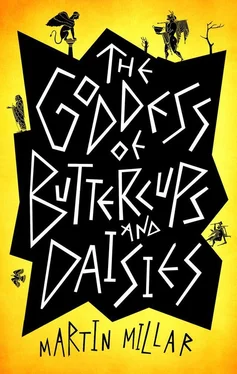‘Why?’
‘I’m already bored by your questions.’
‘I wish you hadn’t destroyed the Altar of Pity. It was a lovely old altar.’
Laet wore the same cold smile. ‘They tried to repair it. And re-sanctify it. The Archon Basileus himself came down to perform the ceremony. For all the good it did.’
Metris nodded sadly. ‘They can’t make it the way it was. You’re too powerful.’
‘I know. And I’m too powerful for you, nymph, even if you can warm a few hearts.’
Metris nodded again. It was true. Laet was too powerful.
‘I tried making buttercups and daises to help the altar. But I couldn’t make any grow.’
Laet nodded. ‘That was a futile effort. Though actually, it wasn’t me that prevented you.’
‘Wasn’t it?’
‘No. Your power here is waning. All the power of the immortals is waning in Athens. The gods are withdrawing.’
‘Why?’
‘It’s just time for it to happen.’ Laet’s eyes narrowed. ‘I’ll spread some misery before I go.’
‘Did something really horrible happen to you when you were young?’ asked Metris. ‘So it left you hating everyone?’
A furious expression flickered over Laet’s face. She controlled it quickly. ‘My past is no concern of yours. It’s time for Aristophanes to make his decision.’
She strode back towards the stage.
‘Well?’ she demanded.
Everyone looked towards Aristophanes. He turned to Bremusa, hoping for some help, but while Bremusa seemed quite calm, she had no advice for him. He could choose either to win the play competition, or win peace for Athens.
‘Zeus damn it,’ he muttered. ‘We can’t risk the peace conference failing. I suppose you’d better go into the judges’ room.’
Laet nodded.
‘Wait,’ called Aristophanes.
‘Yes?’
‘If we make peace now, will Athens return to her former prosperity?’
‘I’m not an oracle. The oracles are coming to an end. Am I the only one who realises that?’
She walked off. Aristophanes turned to Bremusa. ‘Can’t you kill her or something?’
‘No. I’m not allowed. Sorry.’
Socrates emerged from the wings. Theodota followed. Athens’ most beautiful and wealthy hetaera trailing around after Athens’ ugliest philosopher. Aristophanes scowled. He’d never understand it.
‘What just happened?’ asked Socrates.
‘Athens made peace.’
‘Oh. That’s good. Why does no one look happy?’
Bremusa took Aristophanes’ hand. ‘It’s all right,’ she said. ‘You still triumphed. Everyone saw it. You don’t need the prize.’
Aristophanes’ strength deserted him. He sat down on the edge of the stage.
‘Triumph,’ he mumbled. ‘Ha.’
When toils have been resolved, festivity is the best physician;
Songs, the skilful daughters of the Muses, soothe with their touch
Words of praise married to the music of the lyre
Will comfort more than the hot spring.
Words live longer than deeds
When, by the Graces’ assent,
They rise up out of the deep heart.
Next day, Bremusa watched as a crowd of Athenians made their way to the assembly on Pnyx hill. She hurried towards the agora, now nearly empty. Close to the Altar of the Twelve Gods she concealed herself behind a large statue of a discus thrower. As she crouched there, hidden from sight, she noticed how deftly the sculptor had reproduced the lines of the athlete’s calf muscles. For the first time, she felt some appreciation of the sculptor’s art.
That must take a lot of skill.
She peered between the statue’s legs as Idomeneus came into view, striding into the market, his great black beard marking him out as an ancient warrior, the sword on his back catching the rays of the sun. Bremusa had known he’d buy supplies for Laet, before they left the city. She couldn’t let him leave Athens without challenging him. Her honour would not allow it. Yet she knew she couldn’t defeat him in face to face combat.
Laet’s work was done. Bremusa wondered if the people who’d brought her here were pleased with the results. She doubted that Laet would care; she’d amused herself for a while.
As Idomeneus came near, two children suddenly dashed into his path. Young Plato and Xenophon, rolling a wooden hoop along the ground. They shouted and laughed, absorbed in their game. So absorbed were they that they failed to notice Idomeneus, or so it seemed. They crashed into him, the eight-year-old and nine-year-old hitting one leg each and making the Cretan warrior stagger, just for a second.
Bremusa emerged from her hiding place and leapt towards him. She’d hired the children to distract him and they’d done it admirably. Before Idomeneus knew what was happening, she’d grabbed him from behind and had her knife at his throat, touching the skin.
‘Move and I’ll kill you,’ she said.
‘What is this?’
‘This is me defeating you in combat. I could kill you now.’
‘You think jumping out from behind and putting a knife at my throat is defeating me in combat?’
‘Yes.’
Bremusa had a firm grip of Idomeneus’s tunic. He couldn’t turn round, or move at all, without her knife slitting his throat.
‘I never knew an Amazon to act so dishonourably.’
‘I just learned some strategy, Idomeneus. Like the Greeks at Troy. And now, by letting you live, my defeat is avenged, and my honour is restored.’
Bremusa released him. Perhaps Idomeneus would have drawn his sword to fight, but they were interrupted by a low-pitched laugh.
‘Well, Idomeneus. She did seem to best you. For a moment, anyway.’ Laet held out her hand. A stallholder hurried over and placed some grapes in her palm. She put one in her mouth.
‘I never expected my visit to Athens to be so entertaining,’ she said. ‘But we must be off. I’m being paid to curse Melos, and I have something very bad in mind for them.’
Laet wrinkled her nose. ‘These children, they do give me a headache. Come, Idomeneus.’
Idomeneus glared at Bremusa with loathing, but followed his mistress out of the agora. Nearby, a stallholder was looking confused, wondering why she’d just given away free grapes to a women she didn’t know.
Xenophon and Plato were looking on. They’d done their task well. The Amazon thanked them, awkwardly. She rarely knew what to say to children. ‘What are you going to be when you grow up?’
‘A warrior,’ said Plato.
‘A philosopher,’ said Xenophon.
‘I wish you luck.’ Bremusa handed over the silver she’d promised. They ran off, rolling their wooden hoop in front of them.
Nicias was in fine form as he addressed the crowd, speaking much less hesitantly than he normally did. He had good news. It was already known to everyone there, but that didn’t take away from Nicias’s glory in being the one to announce it.
‘… and I hereby confirm that the peace treaty has been signed by myself, Nicias, along with the rest of our delegation, those signatories being Lampon, Isthmonicus, Laches, Euthydemus, Pythodorus, Hagnon, Myrtilus, Lamachus…’
The crowd listened attentively. The oppressive heat that hung over the city had vanished overnight. Spring had resumed and the mood was positive. The war was finally ending. There were only a few glum faces in the crowd. Hyperbolus was one, and Euphranor another. Then there was Aristophanes, who seemed not to be paying attention at all. He sat with his eyes fixed on the ground, apparently unhappy, despite the good news.
Читать дальше












